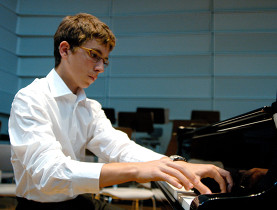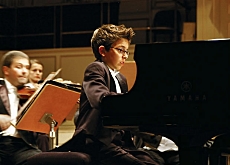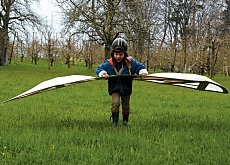“I need to get my energy out somehow!”

Swiss piano prodigy Teo Gheorghiu, who makes his Royal Festival Hall debut in London on Tuesday, tells swissinfo about young fans, musical heroes – and football.
The 16-year-old will perform the Bizet/Busoni Carmen Fantasy as part of “A Night under the Stars”, a charity classical music concert raising money for London’s homeless, hosted by Sir Roger Moore.
Born in Zurich to Romanian and Canadian parents, Gheorghiu won the San Marino International Piano Competition in 2004 and the Purcell School Senior Concerto Competition in 2007.
Since 2001 he has studied at the Purcell School just outside London, a boarding school for young musicians.
In addition to his skills as a pianist, Gheorghiu is a talented actor. In 2006 he played the title role in Fredi M. Murer’s acclaimed film Vitus.
The drama about a child piano prodigy and his grandfather won the Swiss Film Prize and was put forward by Switzerland for the foreign-language film Oscar, although it missed out on a nomination. Vitus has since been sold to more than 30 countries, including the United States and China.
swissinfo: How do you prepare for a performance?
Teo Gheorghiu: Whatever programme I’ve got I tend to go through the material slowly, because then the brain picks it up better – and it’s also easier. And definitely left hand and right hand separately because then the brain is more aware of what each hand is doing. And without pedal, so you can achieve greater legato [smoothness]. The ultimate aim is not to depend on the pedal but to make the pedal just an effect.
When I was younger I was quite lazy, I didn’t like practising slowly – obviously it can get quite boring. But now I enjoy it in a strange way.
swissinfo: Do you think you have a natural talent?
T.G.: I have a certain amount of talent, but it’s also a lot of hard work. Talent helps you pick things up quicker, but you have to be able to understand the music. I think that’s really important because it’s not the same if you just play what’s written on the score. You have to understand the whole structure of the piece.
swissinfo: Do you notice a difference between the way you played a piece of music five years ago and today?
T.G.: When I was 12 I played the Schumann piano concerto [in A Minor, Op. 54] for Vitus and I just recorded it again this month. In that space of time I didn’t play it at all, so I had to learn it again. I understood much more of it and saw all these different possibilities, whereas when I was 12 I only saw one possibility.
It wasn’t bad the way I was playing it, but now I saw these new ideas. I can’t remember details of how I played it when I was 12, but I can tell I have evolved quite a lot and I understand the music much better.
swissinfo: Do you think you would have had the same opportunities had you stayed in Switzerland?
T.G.: I don’t know. I’m very lucky to have had Mr Fong [head of keyboard] as my teacher since I joined the school. I guess I wouldn’t be where I am now without the school and Mr Fong. So, I don’t think so.
I know Zurich is very good for musicians over 18 because of the Zurich Conservatory, but I don’t know for schools. That said, I’ve definitely benefited from being given the opportunity to play concerts in great halls in Switzerland.
swissinfo: You have many young fans and are clearly an inspiration to many young people. How does that make you feel?
T.G.: It’s great! I’m not saying there’s a lack of young people going to concerts, but it would be great to see more young people in the audience. They will have an experience with most classical artists because it really is great music.
swissinfo: And what about your musical heroes?
T.G.: Bach is just unbelievable. If I could do one thing I would go back and go through his mind, all his compositions, the way he lived. Bach was incredible. He makes me think he wasn’t human, because at the time he was so radical. Without Bach, music wouldn’t be where it is now.
But I don’t tend to have a favourite pianist or favourite composer. For example I like Edwin Fischer playing Bach, I like Rubinstein’s or Lipatti’s Chopin and I like Schnabel’s Beethoven or Brendel’s Mozart.
swissinfo: Do you have time for other interests?
T.G.: I really enjoy football. It’s a great contrast to the piano – I need to get my energy out somehow!
swissinfo: Is the school overprotective?
T.G.: No! Of course we’re all musicians here and we need to be careful with our hands – but it doesn’t mean we don’t go in for the tackle! Nothing has ever happened to me on the field. The one time I did injure my hand was when I fell down the stairs as a child, so it can happen anywhere…
swissinfo: You have now probably spent more of your life abroad than in Switzerland. Do you feel slightly estranged from your country of birth?
T.G.: I feel at home wherever I go. I guess Switzerland is still home. I go there for my holidays and obviously my parents live there, so maybe that is home. But I don’t feel British, I don’t feel Swiss. Maybe Romanian a bit, because I have Romanian blood, but I’ve never been there. Canadian? I’ve got a Canadian passport but I’ve only been there once.
I don’t know if home is anywhere, really. I think it’s quite nice being a bit of a free spirit.
swissinfo-interview: Andrew Littlejohn in London
Born in Zurich in 1992, Teo Gheorghiu is already selling out concert halls in Switzerland and is quickly forging an international reputation.
In 2004 he won first prize in the San Marino International Piano Competition and the following year he was awarded first prize in the Franz Liszt International Piano Competition in Weimar, Germany.
Gheorghiu made his debut in the Tonhalle, Zurich, in 2004 with Schumann’s Piano Concerto. Since then he has performed concerti by Mozart, Beethoven, Chopin, Rachmaninov and Bach with ensembles including the Zurich Chamber Orchestra, Orchestra Musikkollegium Winterthur and the Bern Symphony Orchestra.
Gheorghiu’s sell-out performance of Rachmaninov’s Piano Concerto No. 2 at the Tonhalle with the Winterthur Orchestra in May 2007 won him further critical acclaim. The Tages-Anzeiger newspaper described his interpretation as “one of complete musical naturalness … eschewing hyperromanticism in favour of a more sober approach (not unlike Rachmaninov’s own recordings)”.

In compliance with the JTI standards
More: SWI swissinfo.ch certified by the Journalism Trust Initiative



You can find an overview of ongoing debates with our journalists here. Please join us!
If you want to start a conversation about a topic raised in this article or want to report factual errors, email us at english@swissinfo.ch.